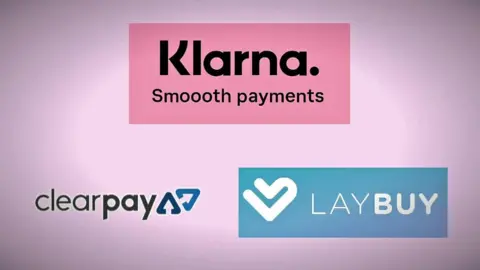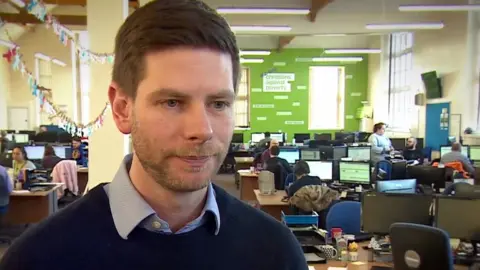The rapid rise of 'Buy now, pay later'
 BBC
BBCAt the end of your online shop, you may have noticed a new way to pay. It's not a bank card, it's not store credit. And it's quick; just a couple of clicks.
So-called "buy now, pay later" services allow customers to either delay the whole bill for their chosen item, or split the cost into a clutch of equal instalments, interest-free.
Despite growing calls from debt charities about these products adding pressure to Britain's multi-billion pound debt pile, UK financial regulators have no plans to investigate them.
The firms are familiar to Dan Lane and his team at Christians Against Poverty, and the charity is keeping a close eye on how they factor into those they help.
"We are confident that the FCA [Financial Conduct Authority] will also be keeping a close eye on these new firms, these new products and seeing how it impacts the people that will be using them. We would expect them to take action as necessary where and when they are able to if it is needed," he says.

The persuasive power of the products is not lost on a group of graduates from Salford University.
"It makes you feel like you're getting an even better deal," says Ellie Kemp. "If you're sensible and responsible, then why not?" adds Rebecca McGrath.
But as they click through a couple of pretend purchases, both the ease of use and the way information presented start to put the group off: "That's where the dangers can come in," says Rebecca. "If you have multiple orders, it's so easy to get carried away. And what is not outlined is what happens if you miss these payments."

Buy now, pay later: The main players

- Klarna Sweden, launched in UK in 2014
- Six million UK customers, adding 55,000 extra a week
- 190,000+ retailers in 17 countries, including ASOS, H&M, TopShop, Michael Kors, Samsung
- Pay 30 days later or split cost of item into three equal instalments
- Unpaid debts from Buy Now, Pay Later products are currently not referred to debt collectors
- Laybuy New Zealand, launched in UK in 2019
- Would not give UK customer numbers
- 800+ retailers, including JD Sports, Footasylum, WH Smith, AX Paris
- Pay in six instalments, interest-free, £6 late fee after 24 hours and again after seven days
- Customers referred to credit agency after 45 days
- ClearPay Australia, launched in UK in 2019
- 500,000+ customers
- Retailers include M&S, Urban Outfitters, Pretty Little Thing
- Pay in four instalments within six weeks, £6 late fee after 24 hours and again after seven days
- Customers can be referred to credit agency at ClearPay's discretion

The BBC contacted Klarna, ClearPay and Laybuy which all said 2019 had been their biggest year yet in the UK. And two of those three main players added 3.3 million new customers to their base - meaning these products have an estimated seven million users.
The UK holds such potential that Gary Rohloff, the cofounder of Laybuy, has moved his family from New Zealand to London, and he expects the UK business to be bigger than in his home country within the next year.
"This is an interest-free credit option, so for a consumer this is a way of buying the things they need," explains Mr Rohloff. "We've had families write to us thanking us for being able to afford raincoats at the start of winter because they couldn't afford to buy coats in one hit but can afford smaller payments over six weeks."
 Laybuy
LaybuyLaybuy, like its competitors, is popular with young people who do not want to take out formal credit arrangements, but also slightly older parents in their 30s and 40s trying to spread costs.
But Mr Rohloff does add that using "buy now, pay later" might encourage a consumer to spend more, saying: "The average order values are significantly higher." Which is why they are so popular with retailers.
Like all such providers, Laybuy says it makes most of its money from the retailers themselves - about £4 in every £100 spent - and defends late fees as an "incentive to pay".
Mr Rohloff maintains that there are sufficient warnings to avoid users getting into trouble. Laybuy is not registered with regulator, the FCA, but does work with Experian to run a hard credit check on users (which can impact their credit score) to make sure they can afford to pay.
"We wouldn't want our sons put in an unsustainable debt position, so we would not allow the company to do that to others," he says.
Regulation is not on the cards yet. The FCA has been looking at consumer credit but because these products do not charge interest, they fall out of their remit for regulation.

However its counterpart in Australia - where these products have been around much longer - undertook a recent review that found numerous causes for concern.
The Australian Securities and Investments Commission highlighted potential risks to the market's under-35 customer base, adding that these arrangements can cause consumers to "become financially over-committed" and therefore likely to face late fees.
ASIC wants its remit extended to cover "buy now, pay later". Here in the UK the FCA has no plans but will continue to monitor the market.
There's no denying these companies are providing some help in a retail slump. But Mr Lane from Christians Against Poverty has one last question for shoppers:
"Overall, we would say to people that if you can't afford the product today - why do you think you could afford it in 30, 60 or 90 days time?"
